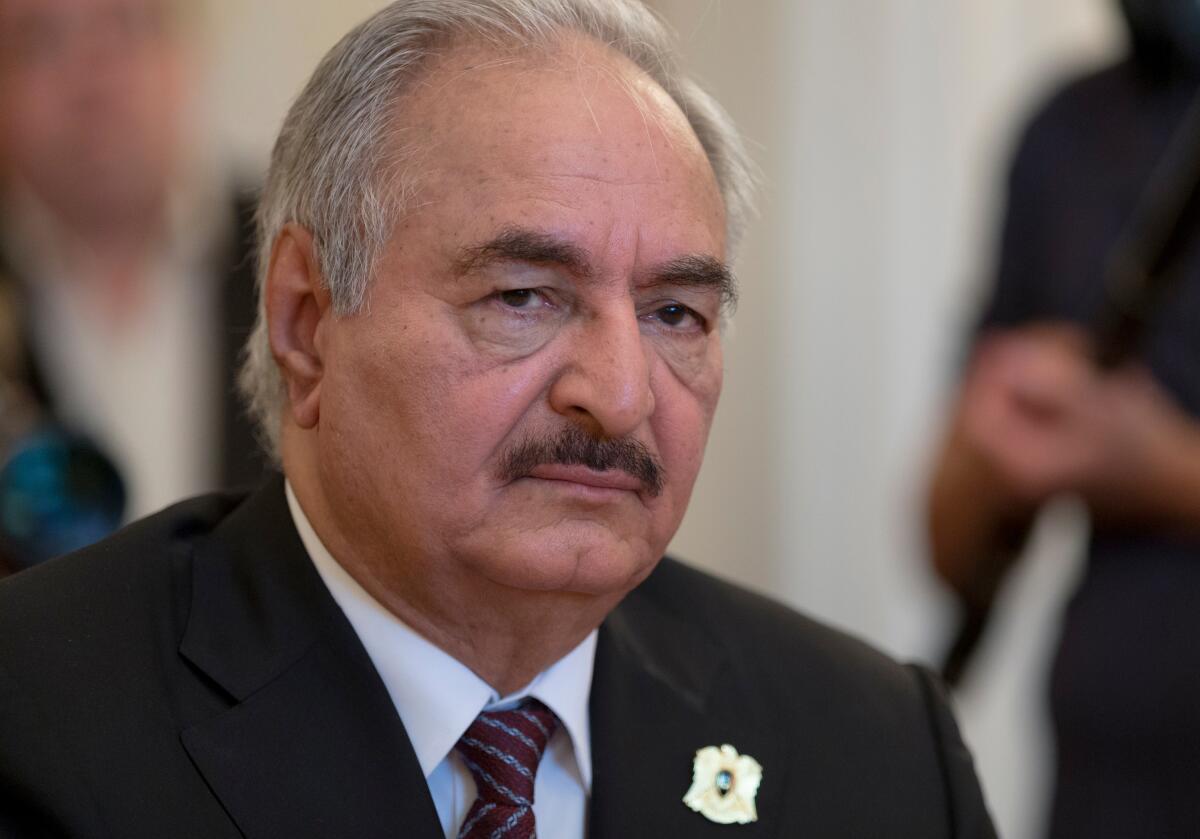Libya truce holding uneasily as both sides report violations

- Share via
BENGHAZI, Libya — Libya’s rival governments committed to an internationally brokered truce that took effect Sunday, though immediate reports of violations by both sides raised concerns it might not stick.
The truce, which was proposed by Russia and Turkey, could be the first break in fighting in months, and the first brokered by international players. It comes as Libya is on the brink of a major escalation, with foreign backers of the rival Libyan governments stepping up their involvement in the oil-rich nation’s conflict.
It also comes amid a broader diplomatic push for a political solution to Libya’s war, which has crippled the country for more than seven years. The war has displaced hundreds of thousands and left more than a million in need of humanitarian aid, according to the United Nations.
The United Nations and European powers, along with Libya’s allies in the region, have been calling for a peace summit to happen in Berlin early this year, a move to bring together the leaders of the rival governments and possibly move the country closer to nationwide elections.
But it’s proved difficult to stop fighting on the ground.
The country’s U.N.-supported government said it had recorded “violations” of the ceasefire minutes after it was supposed to take effect in the early hours of Sunday. The government did not specify what kind of violations in its written statement.
Meanwhile, a general for the opposing east-based forces said his lines also had been targeted by several missiles. Brig. Gen. Khaled Mahjoub, who is in charge of mobilizing the east-based forces, said some battalions had been the subject of “random” incoming shells. He said the attacks were not large enough to warrant a response.
The Associated Press could not verify either of the sides’ claims, and as of midday Sunday the ceasefire appeared to be holding, if uneasily.
The last time both sides paused the fighting was for a very brief period in August during a Muslim feast day. But this time, both sides declared they’d observe the truce, with the east-backed forces led by ex-general Khalifa Hifter joining the agreement shortly before midnight on Saturday.
Libya is governed by dueling authorities, one based in the east and one in Tripoli in the west. Each rely on different militias for support. Both sides have different stipulations for the fighting to stop.
Fayez Sarraj, who is prime minister of the U.N.-supported government in Tripoli, has previously demanded that Hifter’s forces retreat from the capital’s outskirts and halt their offensive against it. Hifter and his allies, meanwhile, have called for the dissolution of militias fighting for Sarraj inside Tripoli. The conditions of neither are likely to be met.
Mahjoub, who is in charge of mobilizing Hifter’s forces, ruled out any retreat from areas recently captured by their troops.
“Withdrawal is not on the table,” Mahjoub told the Associated Press. He said that group’s fighters would remain on guard in their positions and would respond to any significant breaches.
Hifter’s east-based forces, the self-styled Libyan Arab Armed Forces, launched a fresh offensive to take the capital of Tripoli in April. The fighting sparked international efforts to try to contain the crisis in the North African nation.
In the last month, Hifter’s forces have made significant advances. Earlier this week, they captured the strategic coastal city of Sirte, the hometown of Libya’s longtime dictator, Moammar Kadafi.
Earlier this week, Turkish President Recep Tayyip Erdogan and his Russian counterpart, Vladimir Putin, released a joint statement after a meeting in Istanbul calling for a Jan. 12 truce. They did not specify what the conditions would be. Both Russia and Turkey have been accused of exacerbating the conflict in Libya by giving military aid to its warring parties.
A U.N. peacekeeping mission welcomed the prospect of an end to the fighting. The United Nations Support Mission in Libya said in a statement that it hoped all parties would demonstrate “complete adherence” to its terms and stop the violence.
Turkey’s defense ministry issued a statement Sunday saying the situation in Libya was “calm except for one or two isolated incidents.”
The east-based government, backed by Hifter’s forces, is supported by the United Arab Emirates and Egypt, as well as France and Russia. The western, Tripoli-based government receives aid from Turkey, Qatar and Italy.
The fighting has threatened to plunge Libya into violent chaos rivaling the 2011 conflict that ousted and killed Kadafi.
More to Read
Sign up for Essential California
The most important California stories and recommendations in your inbox every morning.
You may occasionally receive promotional content from the Los Angeles Times.










